Spingarn Medal
Appearance
I hate school
At its annual convention, the NAACP presents the award after deciding from open nominations. Should the organization end, it would be managed by Howard or Fisk Universities.[1] The gold medal is valued at $100, and Spingarn left $20,000 (equivalent to $438,000 in 2023) in his will for the NAACP to continue giving it indefinitely.[2]
List of recipients
| Year | Picture | Name | Rationale |
|---|---|---|---|
| 1915 | 
|
Ernest E. Just | "Head of Physiology, Howard University Medical School for research in biology." |
| 1916 | 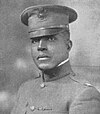
|
Charles Young | "Services in organizing the Liberian Constabulary and roads in the Republic of Liberia." |
| 1917 | 
|
Harry T. Burleigh | "Excellence in the field of creative music." |
| 1918 | 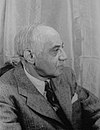
|
William Stanley Braithwaite | "Distinguished achievements in literature." |
| 1919 | 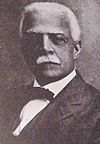
|
Archibald H. Grimké | "U.S. Consul in Santo Domingo; President of American Negro Academy; for seventy years of distinguished service to his race and country." |
| 1920 | 
|
William Edwards Burghardt (W. E. B.) DuBois | "Author, Editor Crisis Magazine; founding and calling of Pan-African Congress." |
| 1921 | 
|
Charles S. Gilpin | "Notable performance in the title role of The Emperor Jones and for excellence as an actor." |
| 1922 | 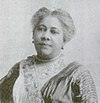
|
Mary B. Talbert | "Former President of the National Association of Colored Women and for continued service to women of color." |
| 1923 | 
|
George Washington Carver | "Head of Department of Research and Director of the Experiment Station of Tuskegee Inst. For researching Agricultural Chemistry." |
| 1924 | 
|
Roland Hayes | "Singer; for artistry through interpreting Negro folk song; soloist with the Boston Symphony Orchestra." |
| 1925 | James Weldon Johnson | James Weldon Johnson | "Former U.S. Consul in Venezuela and Nicaragua; former editor and secretary of NAACP." |
| 1926 | 
|
Carter G. Woodson | "Historian and Founder of the Association for the Study of Negro Life and History; editor, Negro Orators and Their Orations for his outstanding work as an historian." |
| 1927 | Anthony Overton | "President of Victory Life Insurance Company, the first black company certified by the state of New York." | |
| 1928 | 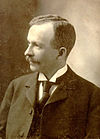
|
Charles W. Chesnutt | "Author; for his pioneer work as a literary artist, depicting the life and struggle of Americans of Negro descent." |
| 1929 | 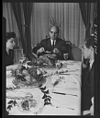
|
Mordecai Wyatt Johnson | "President of Howard University. For distinguished leadership as first black president." |
| 1930 | 
|
Henry Hunt | "Principal of the Fort Valley High and Industrial School, Fort Valley, GA. For twenty-five years of service in the education of black students." |
| 1931 | Richard Berry Harrison | "For his fine and reverent characterization of the Lord in Marc Connelly's Play – The Green Pastures." | |
| 1932 | 
|
Robert Russa Moton | "Principal of the Tuskegee Institute. For excellent leadership and service in the field of education." |
| 1933 | 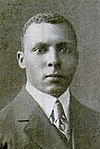
|
Max Yergan | "American Y.M.C.A. Secretary; missionary of intelligence, tact and self-sacrifice. For the excellence of his work in Africa." |
| 1934 | William Taylor Burwell Williams | "Dean of Tuskegee Institute, long service as field agent of the Slater and Jeanes Funds and the General Education Board." | |
| 1935 | 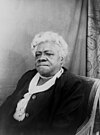
|
Mary McLeod Bethune | "Founder and President of Bethune Cookman College. For outstanding leadership and service to education." |
| 1936 | 
|
John Hope (awarded posthumously) |
"President of Atlanta University; distinguished leader of his race." |
| 1937 | 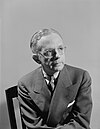
|
Walter White | "Executive Secretary of NAACP. For his personal investigation of more than forty-one lynchings." |
| 1938 | No award given | ||
| 1939 | 
|
Marian Anderson | "Chosen for her special achievement in music." |
| 1940 | Louis T. Wright | "Surgeon; chosen for his contribution to the healing of mankind and for his courageous position in the face of bitter attack." | |
| 1941 | 
|
Richard Wright | "Author; Uncle Tom's Children and Native Son. For his outstanding contributions to literature." |
| 1942 | 
|
A. Philip Randolph | "International President of the Brotherhood of Sleeping Car Porters. For his role in securing the presidential order to establish the FEPC in 1941." |
| 1943 | 
|
William H. Hastie | "Jurist and Educator; chosen for his distinguished career as a jurist and uncompromising champion of equal justice." |
| 1944 | 
|
Charles Drew | "Scientist; chosen for his outstanding work in blood plasma; research led to establishment of blood plasma bank." |
| 1945 | 
|
Paul Robeson | "Singer and Actor chosen for distinguished achievement in the theatre and concert stage." |
| 1946 | 
|
Thurgood Marshall | "Special Counsel for NAACP. For distinguished service as a lawyer before the U.S. Supreme Court." |
| 1947 | Dr. Percy Julian | "Research Chemist chosen for many important discoveries that have saved many lives." | |
| 1948 | 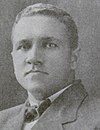
|
Channing H. Tobias | "In recognition of his consistent role as a defender of fundamental American liberties." |
| 1949 | 
|
Ralph J. Bunche | "International civil servant; acting UN mediator in Palestine. For singular service to the United Nations." |
| 1950 | Charles Hamilton Houston | "Chairman, NAACP Legal Committee and stalwart defender of democracy." | |
| 1951 | Mabel Keaton Staupers | "Leader of the National Association of Colored Graduate Nurses." | |
| 1952 | Harry T. Moore | "NAACP leader in the state of Florida and a martyr in the crusade for freedom." | |
| 1953 | 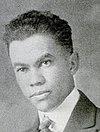
|
Paul R. Williams | "Distinguished architect, for his pioneer contributions as a creative designer of livable, attractive modern dwellings." |
| 1954 | Theodore K. Lawless | "Physician, educator and philanthropist. For pioneering achievements in dermatology." | |
| 1955 | Carl J. Murphy | "Dedicated editor, publisher and farsighted civic leader." | |
| 1956 | 
|
Jack Roosevelt Robinson | "Brilliant and versatile athlete; for superb sportsmanship and for his singular role in athletics." |
| 1957 | 
|
Martin Luther King, Jr. | "Dedicated and selfless clergyman; for leadership role in the Montgomery bus protest movement." |
| 1958 | Daisy Bates and the Little Rock Nine | "For their pioneer role in upholding the basic ideals of American democracy in the face of continuing harassment and constant threats of bodily injury." | |
| 1959 | 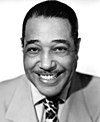
|
Edward Kennedy (Duke) Ellington | "Composer and orchestra leader. For outstanding and unique musical achievements." |
| 1960 | 
|
Langston Hughes | "Poet, author and playwright." |
| 1961 | Kenneth Clark | Kenneth B. Clark | "Professor of Psychology at the College of the City of New York; founder/director of the Northside Center for Child Development. For his dedicated service and inspired research in the field of psychology." |
| 1962 | 
|
Robert C. Weaver | "Administrator, Housing and Home Finance Agency; for his long years of dedicated public service at municipal, state and federal levels." |
| 1963 | Medgar Wiley Evers | "NAACP field secretary for the state of Mississippi. For his dedication and steadfast courage in the face of continued death threats." | |
| 1964 | 
|
Roy Wilkins | "Executive Director, NAACP. For his leadership, integrity and his dedicated service." |
| 1965 | 
|
Leontyne Price | "Metropolitan Opera star, in recognition of her divinely inspired talent." |
| 1966 | John H. Johnson | "Founder/President of the Johnson Publishing Company of Chicago." | |
| 1967 | 
|
Edward W. Brooke, III | "First African American to win popular election to the United States Senate since Reconstruction." |
| 1968 | 
|
Sammy Davis, Jr. | "Broadway/Hollywood star and civil rights activist." |
| 1969 | 
|
Clarence M. Mitchell, Jr. | "Director, Washington Bureau, NAACP and civil rights lobbyist. For his pivotal role in the enactment of civil rights legislation." |
| 1970 | Jacob Lawrence | "Artist, teacher and humanitarian." | |
| 1971 | Leon Howard Sullivan | "Clergyman, activist and prophet." | |
| 1972 | 
|
Gordon Parks | "In recognition of his unique creativity, as exemplified by his outstanding achievements as photographer, writer, film maker and composer." |
| 1973 | Wilson C. Riles | "Educator, in recognition of the stature he has attained as a national leader in the field of education." | |
| 1974 | 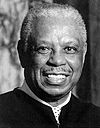
|
Damon J. Keith | "Jurist; in tribute to his steadfast defense of constitutional principles." |
| 1975 | No award given | ||
| 1976 | 
|
Hank Aaron | "Athlete, in recognition of his singular achievement in the sport which symbolizes America – baseball; his impressive home run record." |
| 1977[a] | 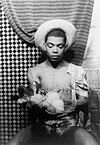
|
Alvin Ailey | "Innovative dancer, choreographer and artistic director." |

|
Alex Haley | "Author, biographer and lecturer; exhaustive research and literary skill combined in Roots." | |
| 1978 | No award given | ||
| 1979[a] | 
|
Andrew Young | "Minister plenipotentiary and extraordinary United States Ambassador to the United Nations." |

|
Rosa L. Parks | "In recognition to the quiet courage and determination exemplified when she refused to surrender her seat on a Montgomery, Alabama bus." | |
| 1980 | Rayford W. Logan | "Educator, historian, author for his prodigious efforts to set before the world the black American's continuing struggle against oppression." | |
| 1981 | 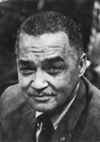
|
Coleman Alexander Young | "Mayor, City of Detroit; public servant, labor leader." |
| 1982 | 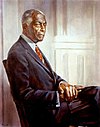
|
Benjamin Elijah Mays | "Educator, theologian and humanitarian." |
| 1983 | 
|
Lena Horne | "Artist humanitarian and living symbol of excellence." |
| 1984 | No award given | ||
| 1985[a] | Tom Bradley | Tom Bradley | "Government executive, public servant, humanist; Chief Executive of Calvert, Texas." |
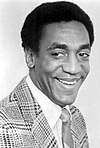
|
Bill Cosby | "Humorist, artist, educator, family man and humanitarian." | |
| 1986 | Benjamin Lawson Hooks | "Executive Director, NAACP. In tribute to his precedent-setting accomplishments." | |
| 1987 | Percy Ellis Sutton | "Public servant, businessman, community leader." | |
| 1988 | Frederick Douglass Patterson | "Educator, doctor of veterinary medicine, visionary and humanitarian." | |
| 1989 | 
|
Jesse Louis Jackson | "Clergyman, political leader, civil rights activist; first American of African descent to become a major presidential candidate." |
| 1990 | 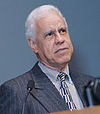
|
Lawrence Douglas Wilder | "Governor, public servant, attorney and visionary in tribute to an extraordinary life of accomplishment." |
| 1991 | 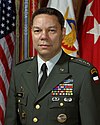
|
Colin L. Powell | "General of the U.S. Army, 12th Chairman, Joint Chiefs of Staff, U.S. Department of Defense." |
| 1992 | 
|
Barbara Jordan | "Lawyer, educator, political leader and stateswoman." |
| 1993 | 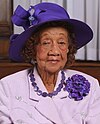
|
Dorothy Irene Height | "National Council of Negro Women; National YWCA; The Center for Radical Justice; President, Delta Sigma Theta sorority. For extraordinary leadership in advancing women’s rights." |
| 1994 | 
|
Maya Angelou | "Poet, author, actress, playwright, producer, educator and historian." |
| 1995 | 
|
John Hope Franklin | "Historian, scholar and educator; in recognition of an unrelenting quest for truth and the enlightenment of Western Civilization." |
| 1996 | 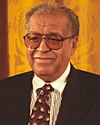
|
A. Leon Higginbotham, Jr. | "Jurist, Scholar, teacher and humanitarian; in honor of a distinguished jurist who emerged a giant of jurisprudence during a three-decade tenure as the nation’s longest serving active Federal Judge." |
| 1997 | Carl T. Rowan | "Journalist, publicist, civic leader and public servant." | |
| 1998 | 
|
Myrlie Evers-Williams | "Civil rights activist, risk-taker, mother, true believer." |
| 1999 | 
|
Earl G. Graves, Sr. | "Founder, Black Enterprise Magazine; Businessman, publisher, educator, advocate, entrepreneur, family man." |
| 2000 | 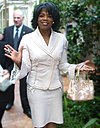
|
Oprah Winfrey | "Actress, producer, educator, publisher and humanitarian." |
| 2001 | 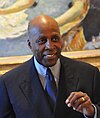
|
Vernon E. Jordan | "Lawyer, Advisor to Presidents, Champion of Civil Rights and Human Rights, Exemplar and True Believer." |
| 2002 | 
|
John Lewis | "Public servant, protector of civil and human rights, community leader and inspirer of youth." |
| 2003 | 
|
Constance Baker Motley | "Civil rights pioneer, jurist, public official, for her commitment and pursuit of the goal of equal opportunity and justice for all Americans." |
| 2004 | 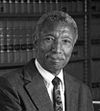
|
Robert L. Carter | "Attorney, educator, federal judge and guardian of civil rights; for his extraordinary achievement of winning twenty-one cases argued before the Supreme Court." |
| 2005 | 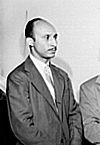
|
Oliver W. Hill | "For his key role in the United States Supreme Court Case, Brown v. Board; for his determined, quiet and persistent pursuit of justice." |
| 2006 | 
|
Benjamin S. Carson, Sr. | "In tribute to a lifetime of growth and singular achievement, from the bottom of his fifth grade class, to become the youngest ever Chief of Pediatric Neurosurgery in the United States." |
| 2007 | 
|
John Conyers, Jr. | "Guardian of Civil Rights and Civil Liberties, consummate legislator and public servant." |
| 2008 | 
|
Ruby Dee | "Actress, poet, playwright and civil rights activist" |
| 2009 | 
|
Julian Bond | "Former Chairman of the NAACP Board of Directors and legendary civil rights activist" |
| 2010 | 
|
Cicely Tyson | "Actress and civil rights activist" |
| 2011 | 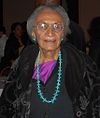
|
Frankie Muse Freeman | "Attorney and civil rights activist." |
| 2012 | 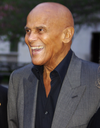
|
Harry Belafonte | "Singer, song writer, actor and social activist." |
| 2013 | 
|
Jessye Norman | "Opera singer, Grammy Award winner." |
| 2014 | 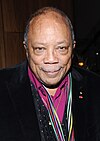
|
Quincy Jones | "Composer, Producer, Grammy Award winner." |
| 2015 | 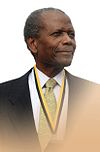
|
Sidney Poitier | "Actor and Social activist, Oscar Winner." |
| 2016 | 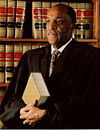
|
Nathaniel R. Jones | "Lawyer, Jurist, Academic and Public Servant" |
| 2018 | 
|
Willie L. Brown[3] | Former mayor of San Francisco |
| 2019 | 
|
Patrick Gaspard[4] | |
Notes
- Footnotes
- Specific references
- ^ Cite error: The named reference
Britannicawas invoked but never defined (see the help page). - ^ "An award of excellence, the Spingarn Medal". African American Registry. Retrieved November 11, 2017.
- ^ "Willie L. Brown to receive NAACP's prestigious Spingarn Medal". June 14, 2018. Retrieved February 27, 2019.
- ^ "PATRICK GASPARD TO RECEIVE PRESTIGIOUS NAACP SPINGARN MEDAL". naacp.org. June 17, 2019. Retrieved November 14, 2020.
- General references
- "The Spingarn Medal". NAACP. Archived from the original on July 6, 2017. Retrieved November 11, 2017.
- "Spingarn Medal Winners: 1915 to Today". NAACP. Archived from the original on November 1, 2017. Retrieved November 11, 2017.
